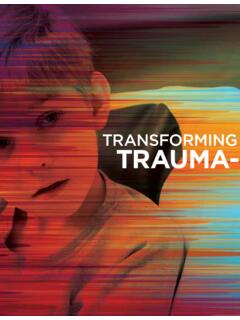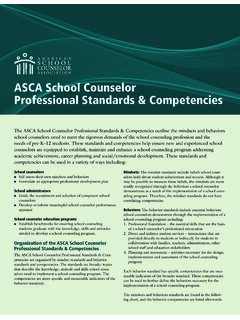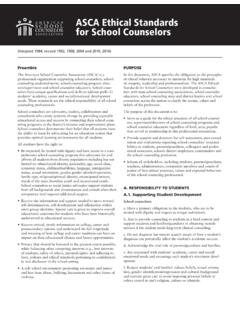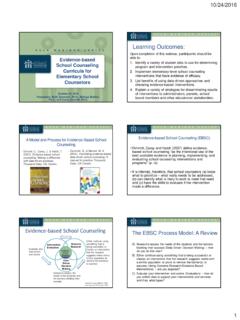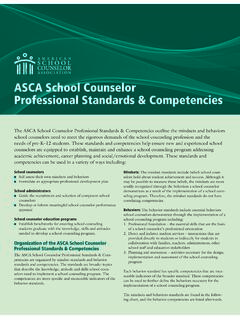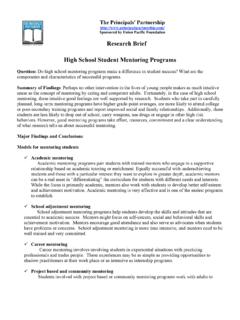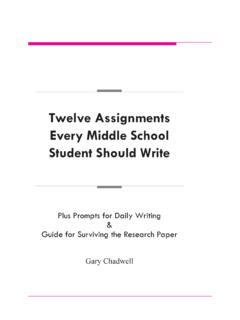Transcription of ASCA Mindsets & Behaviors for Student Success
1 The ASCA Mindsets & Behaviors for Student Success : K-12 College- and Career Readiness for Every Student describe the knowledge, skills and attitudes students need to achieve academ-ic Success , college and career readiness and social/emotional development. The standards are based on a survey of research and best practices in Student achievement from a wide array of educational standards and efforts. These standards are the next generation of the ASCA National Standards for students , which were first published in 35 mindset and behavior standards identify and prioritize the specific attitudes, knowledge and skills students should be able to demonstrate as a result of a school counseling program.
2 School counselors use the standards to assess Student growth and development, guide the development of strategies and activ-ities and create a program that helps students achieve their high-est potential. The ASCA Mindsets & Behaviors can be aligned with initiatives at the district, state and national to reflect the district s local priorities. To operationalize the standards, school counselors select competencies that align with the specific standards and become the foundation for classroom lessons, small groups and activities addressing Student developmental needs. The competencies directly reflect the vision, mission and goals of the compre-hensive school counseling program and align with the school s academic mission.
3 Research-Based StandardsThe ASCA Mindsets & Behaviors are based on a review of re-search and college- and career-readiness documents created by a variety of organizations that have identified strategies making an impact on Student achievement and academic performance. The ASCA Mindsets & Behaviors are organized based on the frame-work of noncognitive factors presented in the critical literature review Teaching Adolescents to Become Learners conducted by the University of Chicago Consortium on Chicago School Research (2012). This literature review recognizes that content knowledge and academic skills are only part of the equation for Student Success . School performance is a complex phenomenon, shaped by a wide variety of factors intrinsic to students and the external environment (University of Chicago, 2012, p.)
4 2). The ASCA Mindsets & Behaviors are based on the evidence of the impor-tance of these Mindsets & Behaviors for Student Success :K-12 College- and Career-Readiness Standards for Every StudentOrganization of the ASCA Mindsets & Behaviors The ASCA Mindsets & Behaviors are organized by domains, standards arranged within categories and subcategories and grade-level competencies. Each is described below. Domains The ASCA Mindsets & Behaviors are organized in three broad domains: academic, career and social/emotional development. These domains promote Mindsets and Behaviors that enhance the learning process and create a culture of college and career readiness for all students .
5 The definitions of each domain are as follows: Academic Development Standards guiding school coun-seling programs to implement strategies and activities to support and maximize each Student s ability to learn. Career Development Standards guiding school counseling programs to help students 1) understand the connection between school and the world of work and 2) plan for and make a successful transition from school to postsecondary ed-ucation and/or the world of work and from job to job across the life span. Social/Emotional Development Standards guiding school counseling programs to help students manage emotions and learn and apply interpersonal skills. StandardsAll 35 standards can be applied to any of the three domains, and the school counselor selects a domain and standard based on the needs of the school, classroom, small group or individual.
6 The standards are arranged within categories and subcategories based on five general categories of noncognitive factors related to academic performance as identified in the 2012 literature review published by the University of Chicago Consortium on Chicago School Research. These categories synthesize the vast array of research literature (p. 8) on noncognitive factors including persistence, resilience, grit, goal-setting, help-seeking, cooperation, conscientiousness, self-efficacy, self-regulation, self-control, self-discipline, motivation, Mindsets , effort, work habits, organization, homework completion, learning strategies and study skills, among others. Category 1: Mindset Standards Includes standards related to the psycho-social attitudes or beliefs students have about themselves in relation to academic work.
7 These make up the students belief system as exhibited in 2014 Category 2: Behavior Standards These standards include Behaviors commonly associated with being a successful Student . These Behaviors are visible, outward signs that a Student is engaged and putting forth effort to learn. The Behaviors are grouped into three Learning Strategies: Processes and tactics students em-ploy to aid in the cognitive work of thinking, remember-ing or Self-management Skills: Continued focus on a goal despite obstacles (grit or persistence) and avoidance of distractions or temptations to prioritize higher pursuits over lower pleasures (delayed gratification, self-discipline, self-control).
8 C. Social Skills: Acceptable Behaviors that improve social interactions, such as those between peers or between stu-dents and ASCA Mindsets & Behaviors for Student Success : K-12 College- and Career-Readiness Standards for Every StudentEach of the following standards can be applied to the academic, career and social/emotional 1: Mindset StandardsSchool counselors encourage the following Mindsets for all students . M 1. Belief in development of whole self, including a healthy balance of mental, social/emotional and physical well-being M 2. Self-confidence in ability to succeed M 3. Sense of belonging in the school environment M 4. Understanding that postsecondary education and life-long learning are necessary for long-term career successM 5.
9 Belief in using abilities to their fullest to achieve high-quality results and outcomesM 6. Positive attitude toward work and learningCategory 2: Behavior StandardsStudents will demonstrate the following standards through classroom lessons, activities and/or individual/small-group counseling. Learning StrategiesSelf-Management Skills Social SkillsB-LS 1. Demonstrate critical-thinking skills to make informed decisions B-SMS 1. Demonstrate ability to assume responsibilityB-SS 1. Use effective oral and written communication skills and listening skillsB-LS 2. Demonstrate creativityB-SMS 2. Demonstrate self-discipline and self-controlB-SS 2. Create positive and supportive relationships with other studentsB-LS 3.
10 Use time-management, organizational and study skills B-SMS 3. Demonstrate ability to work independentlyB-SS 3. Create relationships with adults that support successB-LS 4. Apply self-motivation and self-direction to learning B-SMS 4. Demonstrate ability to delay immediate gratification for long-term rewardsB-SS 4. Demonstrate empathyB-LS 5. Apply media and technology skillsB-SMS 5. Demonstrate perseverance to achieve long- and short-term goals B-SS 5. Demonstrate ethical decision-making and social responsibilityB-LS 6. Set high standards of qualityB-SMS 6. Demonstrate ability to overcome barriers to learningB-SS 6. Use effective collaboration and cooperation skillsB-LS 7.
